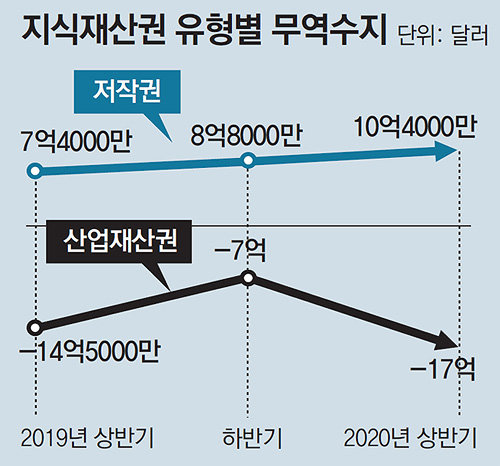S. Korea records first-ever surplus from copyrighted cultural and arts content
S. Korea records first-ever surplus from copyrighted cultural and arts content
Posted September. 19, 2020 07:21,
Updated September. 19, 2020 07:21

In the first half of the year, South Korea saw a trade surplus in culture and arts for the first time, seemingly thanks to high global popularity of Korean pop culture centered around Oscar-winning director Bong Joon-ho’s Parasite and K-pop boy band BTS.
Intellectual property rights including industrial property rights and copyrights recorded a trade deficit of 750 million dollars during the first half, according to data on South Korea’s trade balance regarding intellectual property rights released on Friday by the Bank of Korea. The deficit decreased by 15 percent from 880 million dollars in red on a year-on-year basis.
Notably, copyright-related trade balance remained in surplus of 1.04 billion dollars, the highest record for a time period of six months. Cultural and arts copyrights saw a remarkable trade surplus of 80 million dollars – with South Korean music, TV series, films and literature included in the segment.
“Copyrights brought a higher trade surplus to the country as the exportation of South Korean gaming content rose globally while fewer payments were made by ad companies concerning copyright royalties for visual and audio content,” said a source from BOK. “South Korean TV series and video content may have been the greatest contributor in such improvement.” Indeed, South Korean TV dramas take up a large portion of the list of popular content among Vietnamese and other Asian audiences on Netflix.
R&D and software copyrights including gaming content also showed an increase of 150 million dollars in copyright trade balance to add up to 970 million dollars, compared to the year earlier.
Meanwhile, the trade balance regarding industrial intellectual property rights ended up in red with a deficit volume of 1.7 billion dollars, up by 250 million dollars compared to the first half of last year. Trademark and franchise rights resulted in a deficit of 740 million dollars, up from 10 million dollars. The deficit caused by using source technology related to utility model rights and patents decreased from 1.34 billion to 970 million dollars.
yunjng@donga.com
Headline News
- N. Korea launches cyberattacks on S. Korea's defense companies
- Major university hospital professors consider a day off each week
- Italy suffers from fiscal deficits from ‘Super Bonus’ scheme
- Inter Milan secures 20th Serie A title, surpassing AC Milan
- Ruling and opposition prioritize spending amid tax revenue shortfalls







